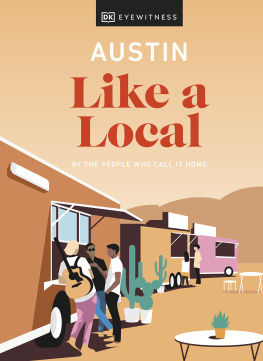Invisible in Austin
Life and Labor in an American City
EDITED BY JAVIER AUYERO
WITH AN AFTERWORD BY LOC WACQUANT

University of Texas Press
Austin
Copyright 2015 by the University of Texas Press
All rights reserved
First edition, 2015
Requests for permission to reproduce material from this work should be sent to:
Permissions
University of Texas Press
P.O. Box 7819
Austin, TX 78713-7819
http://utpress.utexas.edu/index.php/rp-form
Library of Congress Cataloging-in-Publication Data
Invisible in Austin : life and labor in an American city / edited by Javier Auyero ; with an afterword by Loc Wacquant. First edition.
pages cm
Includes bibliographical references.
ISBN 978-1-4773-0364-1 (cloth : alk. paper) ISBN 978-1-4773-0365-8 (pbk. : alk. paper) ISBN 978-1-4773-0366-5 (library e-book) ISBN 978-1-4773-0367-2 (individual e-book)
1. Marginality, SocialTexasAustin. 2. Austin (Tex.)Social conditions. 3. Austin (Tex.)Economic conditions. 4. PoorTexasAustin. 5. MinoritiesTexasAustin. I. Auyero, Javier, editor.
F394.A99I58 2015
976.4'31dc23
2014046938
doi:10.7560/303641
Contents
JAVIER AUYERO
MAGGIE TATE
JACINTO CUVI
KRISTINE KILANSKI
JESSICA DUNNING-LOZANO
ERIC ENRIQUE BORJA
CAITLYN COLLINS
KATHERINE JENSEN
KATHERINE SOBERING
AMIAS MALDONADO
JENNIFER SCOTT
PAMELA NEUMANN
MARCOS PREZ
LOC WACQUANT
Acknowledgments
This book would not have been possible without the cooperation and generosity of the people whose lives we portray in the pages that follow. They opened their homes and their hearts to us, and we are immensely grateful for the opportunity they gave us to learn from them. We hope we did justice to their stories.
Three years ago, after a particularly intense graduate seminar, a few of us decided to embark on this collective project. From the very beginning, we were blessed with the unwavering support of the chair of the Sociology Department at the University of Texas at Austin, Christine Williams. It was Christine who first conceived the Urban Ethnography Labthe intellectual home of this projectas an institutional space to support ethnographic work in sociology. She not only read and commented on several chapters of this book but also provided the intellectual leadership for our scholarly effort to germinate and blossom. Thank you, Christine. And thanks to Dean Randy Diehl at the College of Liberal Arts and to Mark Hayward, director of the Population Research Center at UT, for supporting the work we do in the lab. We are all extremely grateful to Philippe Bourgois, Robert Gay, and Loc Wacquant for their detailed comments and criticisms on earlier drafts of this manuscript.
For the past two years the Urban Ethnography Lab was for us a place of fruitful intellectual exchange and scholarly production. It was also a space where we were able to share and debate the emotional ups and downs involved in ethnographic fieldwork. Various events at the lab such as brown bags, updates from the field, lectures, and workshops fed and nurtured our sociological imagination. From its inception this book has been a collective endeavor made possible, to a great extent, by this wonderful intellectual and affective atmosphere.
As the writing drew to a close photographer Julia Robinson joined the group and produced the wonderful images that illustrate each chapter. Thank you, Julia, and thank you, Eva Hershaw, journalist and photographer, for the beautiful portraits of Santos. More pictures, along with updates on the lives of some of the subjects of this book, can be found at www.othersidesofaustin.com.
Proceeds from this book will go to the Workers Defense Project in Austin, Texas.
INTRODUCTION
Know Them Well
JAVIER AUYERO
A tiny symbol, if one were needed, of all the million circumstances of the other fellows life, of that blizzard of details that constitute the confusion of a human biographya tiny symbol to remind me why our understanding of people must always be at best slightly wrong.
PHILIP ROTH, THE HUMAN STAIN
No social study that does not come back to the problem of biography, of history and of their intersections within a society has completed its intellectual journey.
C. WRIGHT MILLS, THE SOCIOLOGICAL IMAGINATION
It all began with a nagging discomfort that slowly metamorphosed into an incredible, expansive collective energy. It was the spring semester of 2012, and I was teaching a graduate seminar on poverty and marginality in the Americas in the Sociology Department at the University of Texas at Austin, my academic home since 2008. On a weekly basis I subjected my students, a heterogeneous group from my own discipline as well as from anthropology and social work, to the typical graduate seminar drillthree hundred pages or more of reading, electronic notes, and long hours of intense discussions devoted to reviewing past and present analyses of the nature and experiences of poverty and marginality in Latin America and in the United States, examining the most controversial issues and debates and exploring research topics emerging north and south of the border. The discomfort did not take long to emerge: although they were in agreement with diagnoses about the economic and political sources of dispossession, students were uncomfortabledistrustful and on more than one occasion angrywith the ways in which many a text represented the lives of those living at the bottom of the socio-symbolic ladder, including their daily predicaments, their beliefs, and their hopes. Oftentimes entire, and quite diverse, categories (the urban poor, young poor men, poor women) were reduced to one or two salient portrayals (single mother, welfare recipient, sex worker, drug dealer, gang member); other times the complex and changing character of their lives was truncated in order to make (more or less sophisticated) social scientific arguments. Doubts about how well researchers knew the people they were representing, and how well they were representing these people, lingered.
Readings from Pierre Bourdieus now classic The Weight of the World changed the terms of our conversation and first planted the seed for this book. The Weight of the World was the product of many years of collaborative work under the direction of Bourdieu, Frances best known sociologist. A group of twenty or so researchers examined the social, political, and economic forces producing novel forms of suffering, mostly in contemporary France (with two chapters devoted to the United States), and the many ways in which individualsa teacher, a social worker, a factory worker, a migrant, an artisan, and othersdeal and cope with the external forces that deprive them not only of their means of economic subsistence but also, and just as importantly, of the recognition and respect they once enjoyed. The books publication was a major event in France, and it became an instant bestseller because, among other things, it depicts the suffering caused by a shrinking labor market and a retrenching welfare state through a series of lively, eye-opening (and oftentimes heartbreaking) one-on-one interviews with ordinary folks. Usually silenced in public debates, these people and the stories they told speak to larger pressing problems. They talked in highly personal terms about the social, economic, and political sources of their troublesand about their unceasing struggles to regain control over their lives and maintain a sense of dignity in their existence.
Rereading chapters of that book, and with the students shared discomfort in mind, it occurred to me that we could try something along similar lines in the city we call our homean exploration of current forms of social suffering in Austin, Texas, a thriving, rapidly growing, highly unequal, and segregated technopolis. It was not, at the beginning, a well-conceived plan. There was no grant money to support the fieldwork it would require, and there were neither material nor symbolic rewards in sight for those willing to be part of it. I would be lying if I said that I have a clear idea about why students jumped at the opportunityafter all, the cutthroat competition that defines the field of academic production typically militates against collaborations of this kind.
Next page






